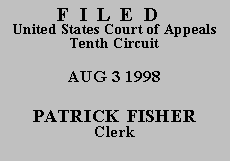

| UNITED STATES OF AMERICA,
v.
DUANE CRIPPS |
No. 98-6046 (D.C. No. CR-97-47-T) |
Duane Alan Cripps appeals his sentence of twelve months following his plea of guilty to the crime of failing to file income tax returns. Mr Cripps claims the district court improperly calculated his criminal history points by including three state convictions for passing bad checks. He contends these offenses should not have been included because he was placed on unsupervised probation for all three offenses; therefore, under United States Sentencing Guideline § 4A1.2(c)(1), these offenses should not have been applied to the criminal history calculation.
The presentence investigation report indicates Mr. Cripps plead guilty to three offenses falling into the category of "insufficient funds" crimes. He claims all three were misdemeanors, but the government contends he is mistaken and one of the offenses was a felony. There is nothing in the record to support that contention except for a case number the government blandly states connotes the offense as a felony. Mr. Cripps, however, does not respond to counter that contention. We are nonetheless unsatisfied, and will for the purposes of this appeal assume all three offenses were misdemeanors as did the district court. The distinction is not significant, however.
The inclusion of the three offenses in the calculation of the criminal history points was based on U.S.S.G. § 4A1.1(d) which provides for a two point increase "if the defendant committed the instant offense while under any criminal justice sentence, including probation, parole, supervised release . . . ." Note 4 to the commentary on § 4A1.1(d) defines "criminal justice sentence" as a sentence "having a custodial or supervisory component, although active supervision is not required." The note explains, "[f]or example, a term of unsupervised probation would be included."
The presentence investigation report shows that at the time Mr. Cripps committed the federal offenses to which he pled guilty, he was under a suspended sentence for insufficient funds crimes in state court. Although both parties argue there was a probation component to those state sentences, the record before us indicates only that sentence was suspended in each case for a period of one year. We will assume, however, such a sentence is the functional equivalent to unsupervised probation.
Notwithstanding the foregoing, Mr. Cripps argues U.S.S.G. § 4A1.2(c), which excludes sentences for insufficient funds check offenses which provide a period of probation of less than one year, should apply here. Yet, because the crimes of conviction in this case were committed while Mr. Cripps was under sentence, § 4A1.1(d) is the proper guideline to be applied. United States v. Pettit, 938 F.2d 175, 178 (10th Cir. 1991). The judgment of the district court is AFFIRMED.
ENTERED FOR THE COURT
John C. Porfilio
Circuit Judge
*. This order and judgment is not binding precedent, except under the doctrines of law of the case, res judicata, and collateral estoppel. This court generally disfavors the citation of orders and judgments; nevertheless, an order and judgment may be cited under the terms and conditions of 10th Cir. R. 36.3.